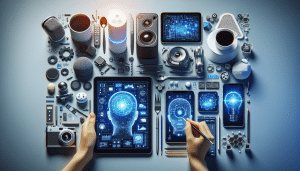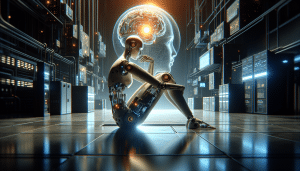Unlocking AI in Everyday Life You May Not Notice
Aiden Foster September 25, 2025
Artificial intelligence shapes daily experiences in subtle ways, often unnoticed by many. This article reveals how AI operates behind the scenes, influencing technology use, consumer choices, healthcare, and more, offering practical insights and sparking fresh curiosity into modern advancements.
How Artificial Intelligence Integrates Seamlessly into Modern Devices
Whether searching for the fastest route home or unlocking a phone with facial recognition, artificial intelligence forms the silent backbone of everyday tech. These systems adapt and learn, identifying patterns in user behavior to streamline experiences. Smartphones, for example, employ machine learning algorithms for voice assistants, spam detection, and even image optimization. Many users do not realize that this learning happens in real time — improving as more data becomes available. The more you use your devices, the smarter they get, creating an efficient digital environment that’s uniquely personalized to each person.
AI-driven apps have expanded rapidly, influencing how content is curated and delivered. Personalized news feeds, video suggestions, and even weather updates are tailored through AI-powered recommendation systems. These systems scan thousands of datapoints, from what you browse to your app interaction history, to serve up content that is most relevant at the moment. Through technologies like natural language processing and neural networks, devices not only process human language but also anticipate needs, often before users consciously realize them.
Privacy is a growing discussion as AI integrates deeper into technology. Companies address this through local, on-device processing, reducing the amount of data sent to external servers. Federated learning lets devices collaborate to improve algorithms without directly sharing raw data, increasing user trust. As a result, AI continues to shape device design and functionality while balancing the vital concerns of data transparency and privacy, evolving responsively to society’s expectations.
AI and Its Role in Personalized Consumer Experiences
Artificial intelligence is transforming the consumer journey from static service models to highly tailored experiences. E-commerce platforms harness behavioral analytics and predictive engines to recommend products, adjust pricing, and customize interface designs. These smart engines rely on complex algorithms to process shopping behavior, purchase history, and trending patterns. The rise of predictive personalization is subtly changing how people discover new products and services, making shopping both faster and more relevant.
Beyond online retail, AI-driven chatbots have grown common in customer support channels, offering efficient assistance without human intervention. These agents analyze questions, detect sentiment, and instantly pull relevant information to resolve common queries or facilitate returns. By utilizing natural language understanding, chatbots create a more interactive and immediate support experience. Their 24/7 availability means consumers access help whenever they encounter issues.
Loyalty programs, too, are adapting AI techniques to predict preferences and offer personalized rewards. By monitoring transactions and engagement patterns, companies can reward frequent shoppers with offers tuned precisely to their individual tastes. This creates a more engaging and rewarding experience, while also increasing customer retention rates. AI-powered strategies continue to set new standards for personalized shopping, leading to a deeper connection between brands and their communities.
Healthcare Advancements Driven by Artificial Intelligence
Healthcare is experiencing a significant transformation thanks to artificial intelligence. From diagnostic tools to administrative workflow automation, AI helps medical professionals deliver more accurate and timely care. Algorithms now support radiologists in analyzing complex imaging data, flagging anomalies such as tumors or fractures with remarkable precision. This assists doctors in making faster, more informed decisions, and it has the potential to reduce cases of misdiagnosis.
Additionally, virtual health assistants powered by AI bridge the gap between systems and patients. These platforms can answer health-related queries, remind individuals to take medication, or flag warning signs before human intervention is needed. Integrating predictive analytics enables better management of chronic diseases by analyzing long-term trends, thus reducing hospital visits and improving quality of life for patients. Accessibility is broadened as remote care becomes more viable in various communities.
AI further contributes to public health by identifying patterns in large datasets—such as outbreak predictions or drug side effects—earlier than traditional analysis. Health agencies use these insights to proactively monitor population health and respond quickly to emerging challenges. Machine learning applications in research accelerate the discovery of effective treatments by simulating thousands of clinical scenarios, opening new doors in both preventive and personalized medicine.
Smart Cities and AI’s Impact on Urban Living
The idea of smart cities has gained traction, with artificial intelligence at the heart of urban innovation. Traffic management systems powered by AI analyze real-time traffic patterns, synchronize traffic lights, and offer dynamic routing suggestions to cut congestion and reduce emissions. Energy grids utilize predictive algorithms to forecast demand and optimize distribution, promoting sustainability while decreasing utility costs for city dwellers.
Public safety is another domain being revolutionized. Video surveillance and emergency response are made more effective by AI-driven systems that recognize suspicious activities faster than human observers. These platforms can flag potential hazards, enabling swift intervention and increasing safety across communities. Predictive policing, while controversial, uses data analytics to help allocate resources where they are most needed, aiming to deter crime before it escalates.
Urban planning increasingly depends on artificial intelligence to model growth scenarios and evaluate the impact of proposed policies. City officials use these insights to design greener spaces, enhance public services, and anticipate environmental needs. From air quality sensors to waste management solutions, AI’s footprint in smart infrastructure builds more resilient and adaptable urban environments for future generations.
Education Enhanced by Artificial Intelligence Tools
AI adoption in education promises more inclusive, adaptive, and effective learning. Intelligent tutoring systems evaluate student progress, flagging strengths and areas needing improvement swiftly. These platforms adapt course content dynamically, ensuring every learner receives instruction at the right difficulty level. Through AI, educators gain precise data on student engagement and performance, allowing for data-driven teaching decisions and targeted support.
Automated grading systems and plagiarism checkers relieve educators of repetitive tasks, making way for more personalized feedback. With natural language processing, these tools interpret open-ended answers, assess reasoning, and offer suggestions for refinement. Online learning platforms recommend tailored modules and resources, drawing from vast datasets to align with individual interests and career goals. Students enjoy a richer, more engaging learning journey that evolves with their needs.
Beyond classrooms, AI powers educational accessibility innovations—like real-time translation and transcription tools—that reduce language barriers or assist those with special needs. Researchers leverage data mining to identify effective teaching approaches, which leads to broader reform and improved learning outcomes across educational systems. The ongoing integration of AI holds promise for democratizing knowledge on a global scale.
Challenges and Ethical Considerations in AI Development
While AI brings transformative benefits, its adoption raises serious challenges. Issues such as algorithmic bias, data privacy, and ethical transparency need careful attention. If not addressed, these challenges can erode public trust and reinforce inequality. Developers spend significant effort building fairness into algorithms—testing them rigorously to prevent discriminatory outcomes based on gender, ethnicity, or socioeconomic status.
The matter of explainability has become crucial: users should understand how decisions are made by algorithms, especially in high-stakes environments like banking or healthcare. Regulators call for rigorous testing and the creation of clear documentation. In parallel, industry groups and advocacy organizations debate the boundaries of automation, transparency requirements, and the responsible handling of sensitive data in AI-powered systems.
Global collaboration plays a pivotal role in establishing standards for responsible AI. From privacy regulations like GDPR to multinational research alliances, cross-border cooperation ensures AI evolves in ways that respect human dignity and promote shared prosperity. These conversations, still evolving, will shape not just the direction of technology, but also its role in society for years to come.
References
1. National Institute of Standards and Technology. (n.d.). Artificial Intelligence. Retrieved from https://www.nist.gov/artificial-intelligence
2. Pew Research Center. (n.d.). AI and Human Enhancement. Retrieved from https://www.pewresearch.org/internet/2022/06/21/the-future-of-human-agency
3. World Health Organization. (n.d.). AI in Healthcare. Retrieved from https://www.who.int/news-room/spotlight/artificial-intelligence-in-healthcare
4. European Commission. (n.d.). Artificial Intelligence for Smart Cities. Retrieved from https://ec.europa.eu/info/research-and-innovation/research-area/industrial-research-and-innovation/artificial-intelligence_en
5. EDUCAUSE. (2022). Artificial Intelligence in Education. Retrieved from https://www.educause.edu/eli/ai
6. U.S. Government Accountability Office. (2021). Artificial Intelligence: Emerging Opportunities, Challenges, and Implications. Retrieved from https://www.gao.gov/products/gao-21-519sp








